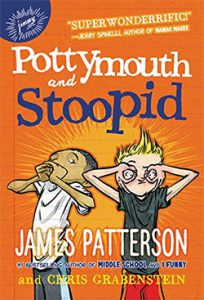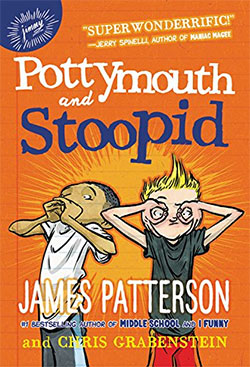Being smart or being different often makes a young person a target for bullies. From age four on, David Scungili and Michael Littlefield have been unfairly labelled as Stoopid and Pottymouth, nicknames that brand them for a life of cruelty, blame, and untruths. Although these details outline the plot of James Patterson and Chris Grabenstein’s recent middle school novel, Pottymouth and Stoopid, the authors also delve into the insidious effects of bullying and the survival tactics used by the bullied. With every chapter creatively illustrated with cartoon-style drawings by Stephen Gilpin, this book performs some myth-busting about the stereotypical bully and gives hope to the “picked-last posse.”
While occasionally over-done and drawn out, Patterson and Grabenstein likely chose that storytelling style intent ionally to send the subliminal message that bullying is tiresome. It transforms attitudes and shapes self-perception, producing hopelessness, pessimism, and bitterness in the bullied. Human nature is such that we often live out the life that has been assigned to us—those that hear daily that they’re stupid, often fulfill that expectation. David’s teachers have described him as having a “short attention span, [lacking] focus, and [needing] to develop better listening skills” (23).
ionally to send the subliminal message that bullying is tiresome. It transforms attitudes and shapes self-perception, producing hopelessness, pessimism, and bitterness in the bullied. Human nature is such that we often live out the life that has been assigned to us—those that hear daily that they’re stupid, often fulfill that expectation. David’s teachers have described him as having a “short attention span, [lacking] focus, and [needing] to develop better listening skills” (23).
Although he’s on the receiving end of negative attitudes and mistreatment, David is a creative, energetic, and curious young man. As he explores, he occasionally blunders, but error has value: mistake-making produces learning and is an essential part of the creative process. Apparently, substitute teacher Mr. Chaffapopoulos doesn’t understand this important fact, however, as he brands David’s best friend Michael with the misnomer: Pottymouth, for his creative speech. Michael’s inventive words—like flufferknuckle—and his ability to imitate voices provide evidence of his creativity and innovation, qualities not appreciated by his classmates or teachers who treat both him and David like “walking, talking insult piñatas” ((168). Clearly, bullies aren’t always the stereotypical muscle-bound boys who steal lunch money. They are teachers and popular, pretty girls like Kaya Kennecky and Tiffany Burke. And bullying takes on many forms–whether name-calling or other forms of microaggression. Contrary to the old school yard taunt about sticks and stones, unfair labels do cause harm. They stick, and they’re hard to lose. Sometimes their effect has terrible and unfortunate consequences.
While telling the story of these misunderstood youth, Patterson and Grabenstein sprinkle their book with words of wisdom, reminding us that some of the things we think we know “are totally and completely wrong” (3). With their character Anna Brittoni, known as Anna Britannica by her classmates, readers learn fun facts like, “You know the guy who invented Pringles? He was cremated. They buried his ashes in a Pringles can. True story” (112). With her idea for the school’s history fair, Anna invites readers to focus on history’s underdogs: “The quiet people who actually made history while other, louder people made all the headlines and grabbed all the glory” (147), people like Henry Woodward and Mathew Evans, two Canadians who filed a patent for an electric lightbulb in 1874 before Thomas Edison’s “invention.” Like their historical counterparts, Anna, Michael, and David “fly under the radar, keep a low profile, make [themselves] a smaller target, and [try to] stay invisible” (69). After all, Anna knows that “There can be only one middle-school princess, but there will always be a million peasants” (215), so perhaps it’s time for a peasants’ revolt?
Through Grandpa Johnny, readers realize the value of having someone who believes in us, someone to explain that nicknames can be fun instead of evil. Grandpa Johnny always has a smile, a little advice, and a plate of freshly baked cookies—qualities that David craves since his mother is forced to work three jobs to make ends meet after David’s father, Tony Scungili, bails on the family. Ex-Dad, as David calls him, barely knows his son, but his vice is punished when he becomes the subject of Cartoon Factory’s slapstick comedy as the character Skunkjelly.
Similar in humor and style to the 1984 film Revenge of the Nerds, this book will entertain as well as inspire and reassure. In a world fraught with tough setbacks, dizzying disappointments, and middle-school dynamics, the familiar trope where evil receives punishment is fictional comfort food.
- Posted by Donna

